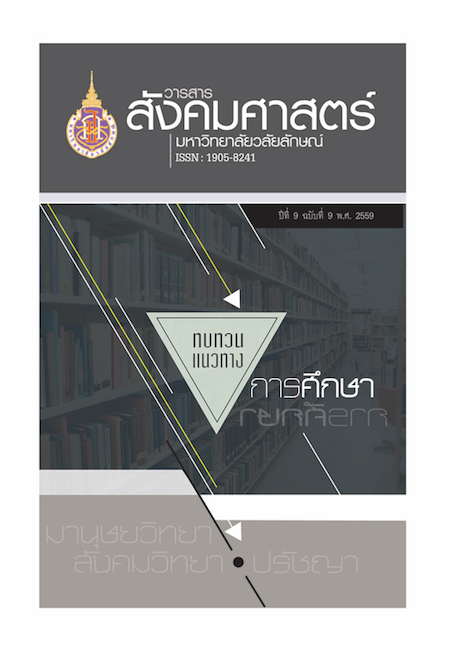Exploring a Philosophical Debate about Emotion and Theory of Embodied Emotion (in Thai)
Main Article Content
Abstract
In a philosophical debate regarding emotion, it is said that there are two major competing theories: feeling theory and cognitive theory. The former asserts that emotions are feelings of bodily changes; the latter contends that emotions are cognitive states concerning intentionality. However, the recent empirical evidence reveals that emotions involve both bodily events and cognitions. Furthermore, it is also held that there can be phenomenology of emotionemotions are conscious experiences as the first person perspective. The concern of philosophers of emotion today is how to formulate an integrated theory compromising these components. In this paper, I explore feeling and cognitive theories of emotion and point out its problems. Then, I investigate an embodied emotion theory as an alternative. I look through Prinz’s embodied emotion theory and argue that although his theory attempts to compromise bodily feeling and cognition, it lacks a phenomenological dimension. So, I introduce Colombetti’s theory which is a new direction for studying emotion. Her theory is not only to integrate bodily and cognitive states but also recognize the phenomenology of emotion.
สำรวจข้อถกเถียงทางปรัชญาเกี่ยวกับอารมณ์และทฤษฎี อารมณ์สมานกาย
ในประวัติศาสตร์การถกเถียงทางปรัชญา เกี่ยวกับอารมณ์มีทฤษฎีซึ่งเป็นที่โต้แย้งกันอยู่สอง ทฤษฎีดังนี้ ทฤษฎีความรู้สึก (Feeling Theory) เห็นว่าอารมณ์คือความรู้สึกถึงการเปลี่ยนแปลงใน ร่างกาย และทฤษฎีการรู้คิด (Cognitive Theory) เห็นว่าอารมณ์คือสภาวะทางจิตที่เกี่ยวข้องกับการ รู้คิดซึ่งมีคุณลักษณะการมุ่งสู่เป้าหมายของจิต (Intentionality) ทฤษฎีทั้งสองมีความขัดแย้งกัน ทว่าหลักฐานเชิงประจักษ์ในปัจจุบันชี้ว่าอารมณ์มีความเกี่ยวข้องกันทั้ง ความรู้สึกทางร่างกายและการรู้คิด ปัญหาสำคัญของนักปรัชญาที่ศึกษา อารมณ์ในปัจจุบันคือ การพยายามสร้างทฤษฎีเพื่อประนีประนอมทฤษฎี ทั้งสองเข้าด้วยกัน นอกจากนี้ มีนักปรัชญาอารมณ์บางส่วนเชื่อว่า อารมณ์เกี่ยวข้องกับแง่มุมทางปรากฏการณ์วิทยาของจิตสำนึกด้วย กล่าวคือ โดยส่วนใหญ่แล้วเราจะสำนึกรู้อารมณ์ในฐานะที่เป็น ประสบการณ์ความรู้สึก (Conscious Experience) ซึ่งมีคุณลักษณะ ของประสบการณ์ส่วนตัวจากมุมมองเชิงอัตวิสัย ในบทความนี้ ผู้เขียนสำรวจทฤษฎีทั้งสองข้างต้นพร้อมทั้งชี้ให้ เห็นปัญหาบางประการ โดยสำรวจทฤษฎีอารมณ์สมานกาย (Embodied Emotion) ซึ่งเป็นทฤษฎีทางเลือกที่พยายามประนีประนอมทฤษฎีทั้งสอง ข้างต้น ผู้เขียนเลือกสำรวจแนวคิดอารมณ์สมานกายที่เสนอโดย Prinz พร้อมทั้งแสดงให้เห็นว่าแนวคิดนี้เป็นการพยายามประนีประนอมทฤษฎี ข้างต้นทั้งสองทฤษฎีเข้าด้วยกันอย่างน่าสนใจ ทว่าขาดแง่มุมทาง ปรากฏการณ์วิทยา ผู้เขียนได้แนะนำแนวคิดของ Colombetti ซึ่งถือ เป็นทิศทางใหม่ในการศึกษาอารมณ์ในลักษณะบูรณาการที่ครอบคลุมทั้ง สองทฤษฎีข้างต้นแล้วยังให้ความสำคัญกับแง่มุมทางปรากฏการณ์วิทยา ของอารมณ์อีกด้วย
Article Details
Copyright: CC BY-NC-ND 4.0


